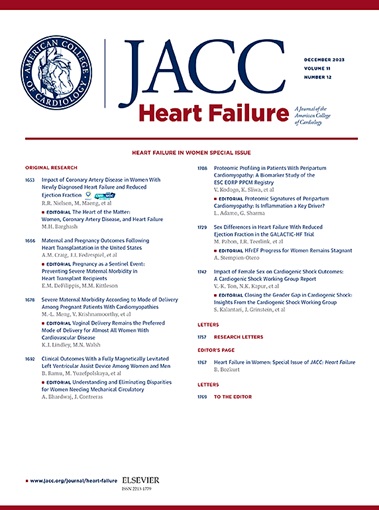Comparison of Investigator-Reported and Centrally Adjudicated Heart Failure Outcomes in the EMPEROR-Preserved Trial
IF 10.3
1区 医学
Q1 CARDIAC & CARDIOVASCULAR SYSTEMS
引用次数: 0
Abstract
Background
There is limited published information on outcome adjudication in heart failure (HF) trials, particularly in heart failure with preserved ejection fraction (HFpEF).
Objectives
The study sought to compare investigator reports with clinical events committee (CEC) adjudication and assess the impact of the SCTI (Standardized Data Collection for Cardiovascular Trials) criteria.
Methods
In the EMPEROR-Preserved (EMPagliflozin outcome tRial in Patients with chronic heart Failure With Preserved Ejection Fraction) trial, we compared investigator reports with CEC for concordance, treatment effect on primary composite outcome events and components (first event primary heart failure hospitalization [HHF] or cardiovascular [CV] mortality), prognosis after first HHF, total HHF, and trial duration with and without SCTI criteria.
Results
The CEC confirmed 67.4% investigator-reported events for the primary outcome (CV mortality 82.7%, HHF 66.3%). The HR for treatment effect did not differ between adjudication methods for the primary outcome: investigator reports (HR: 0.77; 95% CI: 0.69-0.87), CEC (HR: 0.79; 95% CI: 0.69-0.90), its components, or total HHFs. The prognosis after the first HHF for all-cause mortality and CV mortality also did not differ between investigator reports and the CEC, nor did investigator reports and HHFs with a different CEC cause. SCTI criteria were present in 92% of CEC HHFs with a similar treatment effect to non-SCTI criteria. The investigator-reported primary events reached the protocol target number 6 months earlier than the CEC (7 months with full SCTI criteria).
Conclusions
Investigator adjudication is an alternative to a CEC with similar accuracy and faster event accumulation in HFpEF. The use of granular (SCTI) criteria did not improve trial performance. Our data suggest that a broader definition of an HHF event could be particularly beneficial in HFpEF clinical trials. (EMPagliflozin outcome tRial in Patients with chronic heart Failure With Preserved Ejection Fraction; NCT03057951).
在皇帝保存试验中研究者报告和中央裁决的心力衰竭结果的比较。
背景:关于心力衰竭(HF)试验结果判定的已发表信息有限,特别是保留射血分数(HFpEF)的心力衰竭。目的:本研究旨在比较研究者报告与临床事件委员会(CEC)裁决,并评估SCTI(心血管试验标准化数据收集)标准的影响。方法:在EMPEROR-Preserved (EMPagliflozin结局试验在保留射血分数的慢性心力衰竭患者中)试验中,我们比较了研究者报告与CEC的一致性、对主要复合结局事件和组成部分(首次事件原发性心力衰竭住院[HHF]或心血管[CV]死亡率)的治疗效果、首次HHF后的预后、总HHF以及有无SCTI标准的试验持续时间。CEC确认了67.4%的研究者报告的主要结局事件(CV死亡率82.7%,HHF 66.3%)。治疗效果的HR在主要结局的判定方法之间没有差异:研究者报告(HR: 0.77;95% ci: 0.69-0.87), cec (hr: 0.79;95% CI: 0.69-0.90),其组成部分,或总hfs。首次HHF后的全因死亡率和CV死亡率的预后在研究者报告和CEC之间也没有差异,研究者报告和不同CEC原因的HHF也没有差异。92%的CEC HHFs存在SCTI标准,治疗效果与非SCTI标准相似。研究者报告的主要事件比CEC早6个月达到协议目标数(符合完整SCTI标准的7个月)。结论:在HFpEF中,研究者裁决是CEC的替代选择,具有相似的准确性和更快的事件积累。使用颗粒(SCTI)标准并没有提高试验性能。我们的数据表明,在HFpEF临床试验中,更广泛的HHF事件定义可能特别有益。empag列净在保留射血分数的慢性心力衰竭患者中的结局试验;NCT03057951)。
本文章由计算机程序翻译,如有差异,请以英文原文为准。
求助全文
约1分钟内获得全文
求助全文
来源期刊

JACC. Heart failure
CARDIAC & CARDIOVASCULAR SYSTEMS-
CiteScore
21.20
自引率
2.30%
发文量
164
期刊介绍:
JACC: Heart Failure publishes crucial findings on the pathophysiology, diagnosis, treatment, and care of heart failure patients. The goal is to enhance understanding through timely scientific communication on disease, clinical trials, outcomes, and therapeutic advances. The Journal fosters interdisciplinary connections with neuroscience, pulmonary medicine, nephrology, electrophysiology, and surgery related to heart failure. It also covers articles on pharmacogenetics, biomarkers, and metabolomics.
 求助内容:
求助内容: 应助结果提醒方式:
应助结果提醒方式:


